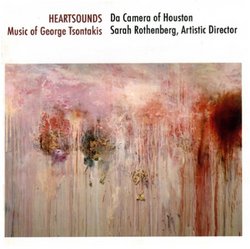| All Artists: George Tsontakis, Camera of Houston Title: Heartsounds: Music of Tsontakis Members Wishing: 0 Total Copies: 0 Label: Koch Int'l Classics Release Date: 11/23/2004 Genre: Classical Styles: Chamber Music, Historical Periods, Classical (c.1770-1830) Number of Discs: 1 SwapaCD Credits: 1 UPC: 099923757924 |
Search - George Tsontakis, Camera of Houston :: Heartsounds: Music of Tsontakis
 | George Tsontakis, Camera of Houston Heartsounds: Music of Tsontakis Genre: Classical
|
Larger Image |
CD Details |
CD ReviewsShould be better known! Thomas F. Dillingham | Columbia, Missouri USA | 01/24/2005 (5 out of 5 stars) "George Tsontakis won the Gravemeyer Award a few months ago for his Quartet #5, which still has not been recorded; I am eager to hear it. Several other works have been recorded, however, including the wonderful New York Variations and Four Symphonic Quartets. "Heartsounds," however, is easy to recommend as a first encounter. Of the three pieces recorded here, one is a short piano solo piece that is charming enough, but not enough to grab our attention. The two small ensemble pieces, however, "Meditations at Perigee for Piano and Six Instruments," and the title piece, are both firstrate and would tempt anyone to seek more of Tsontakis's work. "Heartsounds" employs violin, viola, cello, piano, and bass (as the notes remind us, the same instruments Schubert used for the "Trout"), while "Meditations" includes the same instruments, with the addition of a clarinet. Tsontakis makes the most of the possibilities of these combinations, creating fascinating and intricate interweavings of both instrumental sounds and musical styles and types. This is surely one of the most enjoyable recordings of contemporary music I have heard recently." Highly Recommended Chamber Music Works by George Tsontakis J Scott Morrison | Middlebury VT, USA | 04/24/2005 (5 out of 5 stars) "George Tsontakis is a contemporary composer for whom I have the strongest regard. I have never heard a less than effective work from his pen. His 'Ghost Variations' for solo piano, recorded by Stephen Hough, is a modern masterpiece. His Four Symphonic Quartets, inspired by T.S. Eliot's poems, 'Four Quartets,' are likewise extraordinarily attractive works. I'm also very fond of the Third and Fourth String Quartets recorded by the American String Quartet. All of these are available here at Amazon. On this disc are three chamber works: 'Heartsounds' for violin, viola, cello, doublebass and piano; 'Meditations at Perigee' for piano and clarinet, horn, violin, viola, cellos and doublebass; and, for solo piano, 'Sarabesque.'
In all these works the piano is the first among equals and all of them are played gorgeously by pianist Sarah Rothenberg; indeed, the six-minute 'Sarabesque' was written (and named) for her. 'Meditations' begins with a very long piano introduction before the other instruments chime in. In both the ensemble pieces the writing is characterized by, among other things, pointillistic and polytonal use of the instruments; pulsing that sounds, but really isn't, minimalistic; and elements of birdsong. Also common to all these works are hints of simple chorale, hymn or folk-song tunes, often clothed in a kind of fragile melancholy. There is sometimes a Janacek-like insistent, almost hypnotic repetition of melodic and harmonic cells. Add to that a classical balance and formal organization and you get intensely satisfying, emotionally immediate, and ultimately haunting works. I've been listening to these present pieces for more than a month and have come to absorb and appreciate them more and more. On a couple of occasions snatches of these works have even provided the background music for my nighttime dreaming, a kind of nocturnal Ohrwurm. Rothenberg's compatriots in the ensemble pieces are all highly distinguished instrumentalists, mostly from the New York scene, and they give inspired performances. Considering that these works were written over a period of thirteen years (Heartsounds, 1990; Meditations, 1997; Sarabesque, 2003) they are nonetheless all of a piece. I've heard enough of Tsontakis's works over the last twenty-five years to recognize his music within a few measures, and I've often thought that all his works taken together make up a kind of meta-work. It is a great honor for him to have won the Grawemeyer* and for him to be getting more and more performances all over the world. He has been laboring in the vineyard these many years and this well-deserved recognition has been late in coming. Strongest recommendation. Scott Morrison [*A small correction to Thomas F. Dillingham's earlier review here. Tsontakis won the extremely prestigious (and remunerative) Grawemeyer Award not for a string quartet but for his Second Violin Concerto, which has not, as far as I know, been recorded yet.]" |

 Track Listings (7) - Disc #1
Track Listings (7) - Disc #1